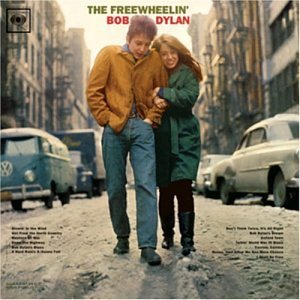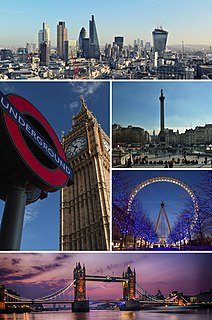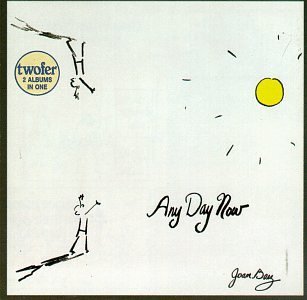
Highway 61 Revisited is the sixth studio album by American singer-songwriter Bob Dylan, released on August 30, 1965 by Columbia Records. Having until then recorded mostly acoustic music, Dylan used rock musicians as his backing band on every track of the album, except for the closing track, the 11-minute ballad "Desolation Row". Critics have focused on the innovative way Dylan combined driving, blues-based music with the subtlety of poetry to create songs that captured the political and cultural chaos of contemporary America. Author Michael Gray has argued that, in an important sense, the 1960s "started" with this album.
"Desolation Row" is a 1965 song written and sung by Bob Dylan. It was recorded on August 4, 1965 and released as the closing track of Dylan's sixth studio album, Highway 61 Revisited. It has been noted for its length (11:21) and surreal lyrics in which Dylan weaves characters from history, fiction, the Bible and his own invention into a series of vignettes that suggest entropy and urban chaos.

Blonde on Blonde is the seventh studio album by American singer-songwriter Bob Dylan, released June 20, 1966 on Columbia Records. Recording sessions began in New York in October 1965 with numerous backing musicians, including members of Dylan's live backing band, the Hawks. Though sessions continued until January 1966, they yielded only one track that made it onto the final album—"One of Us Must Know ". At producer Bob Johnston's suggestion, Dylan, keyboardist Al Kooper, and guitarist Robbie Robertson moved to the CBS studios in Nashville, Tennessee. These sessions, augmented by some of Nashville's top session musicians, were more fruitful, and in February and March all the remaining songs for the album were recorded.

The Freewheelin' Bob Dylan is the second studio album by American singer-songwriter Bob Dylan, released on May 27, 1963 by Columbia Records. Whereas his self-titled debut album Bob Dylan had contained only two original songs, Freewheelin' represented the beginning of Dylan's writing contemporary words to traditional melodies. Eleven of the thirteen songs on the album are Dylan's original compositions. The album opens with "Blowin' in the Wind", which became an anthem of the 1960s, and an international hit for folk trio Peter, Paul & Mary soon after the release of Freewheelin'. The album featured several other songs which came to be regarded as among Dylan's best compositions and classics of the 1960s folk scene: "Girl from the North Country", "Masters of War", "A Hard Rain's a-Gonna Fall" and "Don't Think Twice, It's All Right".

"Blowin' in the Wind" is a song written by Bob Dylan in 1962 and released as a single and on his album The Freewheelin' Bob Dylan in 1963. Although it has been described as a protest song, it poses a series of rhetorical questions about peace, war, and freedom. The refrain "The answer, my friend, is blowin' in the wind" has been described as "impenetrably ambiguous: either the answer is so obvious it is right in your face, or the answer is as intangible as the wind".

The Bootleg Series Vol. 7: No Direction Home: The Soundtrack is the fifth installment in the Bob Dylan "Bootleg Series" of rare and/or officially unissued recordings. It was released in 2005 in conjunction with the Martin Scorsese PBS television documentary on Dylan No Direction Home, and was compiled with Scorsese's input. It features mostly previously unreleased material from Dylan's formative years to his rise as an international figure, spanning 1959 to his legendary 1966 world tour.
"Masters of War" is a song by Bob Dylan, written over the winter of 1962–63 and released on the album The Freewheelin' Bob Dylan in the spring of 1963. The song's melody was adapted from the traditional "Nottamun Town". Dylan's lyrics are a protest against the Cold War nuclear arms build-up of the early 1960s.

"Stuck Inside of Mobile with the Memphis Blues Again" is a song written by Bob Dylan that appears on his 1966 album Blonde on Blonde. The album version also appears on 1971's Bob Dylan's Greatest Hits Vol. II. An early studio take, done in a faster cut-time, was released on The Bootleg Series Vol. 7: No Direction Home: The Soundtrack in 2005. As the recording indicates, Dylan had difficulty fitting the words to the tempo, and evidently this led to its rearrangement, as heard on Blonde on Blonde, in a more "rock"-oriented 4/4 time.
"Bob Dylan's Dream" is a song written by Bob Dylan in 1963. It was recorded by Dylan on April 24, 1963, and was released by Columbia Records a month later on the album The Freewheelin' Bob Dylan.
"Girl from the North Country" is a song written by Bob Dylan. It was recorded at Columbia Recording Studios in New York City in April 1963, and released the following month as the second track on Dylan's second studio album, The Freewheelin' Bob Dylan. Dylan re-recorded the song as a duet with Johnny Cash in February 1969. That recording became the opening track on Nashville Skyline, Dylan's ninth studio album.
"Let Me Die In My Footsteps" is a song written by American singer-songwriter Bob Dylan in February 1962. The song was selected for the original sequence of Dylan's 1963 album The Freewheelin' Bob Dylan, but was replaced by "A Hard Rain's A-Gonna Fall". This version was recorded at Columbia studios on April 25, 1962, during the first Freewheelin' session, and was subsequently released in March 1991 on The Bootleg Series Volumes 1-3 1961-1991.

"If You Gotta Go, Go Now" is a song written by Bob Dylan in 1964. The first released version was as a single in the US by the UK group The Liverpool Five in July 1965, but this went uncharted in the US despite receiving much airplay, particularly in the Pacific Northwest. Another English band, Manfred Mann, then issued the song as a single in September 1965; this version reached number 2 on the UK charts.
"I'll Keep It with Mine" is a song written by Bob Dylan in 1964, first officially released by folk singer Judy Collins as a single in 1965. Dylan attempted to record the song for his 1966 album Blonde on Blonde.
"Oxford Town" is a song written by American singer-songwriter Bob Dylan in 1962. It was recorded in Columbia's Studio A on December 6, 1962 for his second album, The Freewheelin' Bob Dylan.
"Talkin' John Birch Paranoid Blues", also known as "Talkin' John Birch Society Blues" and "Talkin' John Birch Blues", is a protest song and talking blues song written by singer-songwriter Bob Dylan in 1962. It is a satirical song, in which a paranoid narrator is convinced that communists, or "Reds" as he calls them, are infiltrating the country. He joins the John Birch Society, an anti-communist group, and begins searching for Reds everywhere. The narrator decries Betsy Ross as a communist and four U.S. Presidents as Russian spies, while lauding Adolf Hitler and George Lincoln Rockwell. After exhausting the possibilities of new places to find communists, he begins to investigate himself.
"She's Your Lover Now" is a song written by singer-songwriter Bob Dylan, and recorded for his 1966 album, Blonde on Blonde, but ultimately never used. It is a "dramatized scene for three players, but only one speaker - the singer - who's attempting to unravel a tangle of complicated emotions."
"Last Thoughts on Woody Guthrie" is a poem written by American singer-songwriter Bob Dylan, and recited live during his April 12, 1963 performance at New York City's Town Hall. It was released in 1991 on The Bootleg Series Volumes 1-3 1961-1991 after circulating on bootleg releases for years, even appearing on the ten-LP box set Ten of Swords in 1985.

The Bootleg Series Vol. 9: The Witmark Demos: 1962–1964 is an album of demo recordings by Bob Dylan made for his first two publishing companies, Leeds Music and M. Witmark & Sons, from 1962 to 1964. The seventh installment of the ongoing Bob Dylan Bootleg Series, it was released on October 19, 2010 on Legacy Records.
"Farewell", also known as "Fare Thee Well", is a song by American singer-songwriter Bob Dylan. Dylan wrote the song in January 1963. He considered it for his third album, The Times They Are a-Changin', but only attempted a few takes during the album's first studio session. Dylan's earlier recordings of "Farewell" found their way onto various bootlegs, and a collection of demos that included the song was released in October 2010 on The Bootleg Series Vol. 9 – The Witmark Demos: 1962–1964.
"Santa-Fe" is a song that was recorded by Bob Dylan and the Band in the summer or fall of 1967 in the Woodstock area of New York State. It was recorded during the sessions that would in 1975 be released on The Basement Tapes but was not included on that album. These sessions took place in three phases throughout the year, at a trio of houses, and "Santa-Fe" was likely put on tape in the second of these, at a home of some of the Band members, known as Big Pink. The composition, which has been characterized as a "nonsense" song, was copyrighted in 1973 with lyrics that differ noticeably from those on the recording itself.















